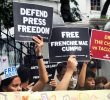Rice, according to Mella, has been proven to be one of the most effective items to win votes, particularly from those who are living below the poverty line. “Hangga’t gutom ang tao, nabibili ang boto nya sa tatlong kilong bigas lamang (as long as the people are hungry, their votes could be bought for even three kilos of rice),” she said.
By DANILDA L. FUSILERO
Davao Today
KIDAPAWAN CITY, Cotabato, Philippines – As election day nears, many are anticipating the “goods” to come in.
“Gahulat pa ko sa akong Santa-Candidato, depende kinsa ang highest payor o kaha kinsa maka-una (I am still waiting for my Santa- candidate. It depends on who has the highest offer or whoever comes first),” 38-year old Mario (not his real name), a mechanic, casually told davaotoday.com.
He said the offer might shoot up because of the “close fight” between the two opposing candidates for mayor, referring to independent Ernido Gantuangco and incumbent Vice Mayor Joseph Evangelista.
First-time voter Balyn, 18 has a different story to tell. She said she wants to save money for her enrolment this June.
“Mas maayo gani unta kung moabot libo ang palitay kay dako na’g tabang sa pagpa-enrol nako (I hope they would pay about a thousand pesos because it would help a lot for my education),” the self-supporting second year college student hoped.
Vote buying costs PHP 100 to 200, or even higher in the case of wholesale votes by an entire family.
The cases of Mario and Balyn are just few of the many stories of “votes for sale” here. Other forms of electoral enticement include politicians’ giving-out donations and promising employment. There are also who enjoy an all-expense paid getaway trips to resorts.
The age-old practice of distributing rice and canned goods still exists, especially in remote villages and thickly-populated urban communities.
“Bigas, dahil ‘yon ang basic need ng karamihan ng Pinoy (Because rice is a basic need of every Filipino),” said Psychologist Framer Mella of the United Methodist Church.
Rice, according to Mella, has been proven to be one of the most effective items to win votes, particularly from those who are living below the poverty line. “Hangga’t gutom ang tao, nabibili ang boto nya sa tatlong kilong bigas lamang (as long as the people are hungry, their votes could be bought for even three kilos of rice),” she said.
Sister Lalyn Macahilo, OND of Pagbabago People’s Movement for Change echoed Mella’s statement, saying many will resort to selling votes because food tops an individual’s hierarchical needs.
Mella also said the debt of gratitude plays a big part to entice votes, citing the case of candidates whose posters have images of their deceased parents who were also noted politicians.
“The poster’s message is: gaya ako ng namatay kong tatay or nanay na matulungin, mabait at mapakatiwalaan, at tumulong sa inyo, in subtle way. Naniningil ng utang na loob sa mga natulungan ng kanyang magulang (I’m just like my parent who was helpful, kind, trustworthy and who helped. They are asking the voters to repay that gratitude),” she said.
Mella also said that politicians who used the power of a “motherly touch” may have better chances of winning the sympathy of the poor electorate.
“Kung ang naghihikaos na magsasaka ay nakamayan at natapik sa balikat o kaya naakbayan ng isang politico, malaking bagay na iyon sa pag-angat ng self-esteem niya,” Mella said.
For Rev. Pastor Ernesto Ramos of Kabacan’s United Methodist Church, “Sobrang mababaw ang kaligayahan nating mga mahihirap, nahawakan lang lalo pa’t may sukbit na pera , okey na ‘yan,”adding that “Hanggat bulok ang sistema ng pamahalaan at eleksyon, hindi matitigil ‘yan.” (Danilda L. Fusilero/davaotoday.com)
cotabato, Election, kidapawan, vote buying










